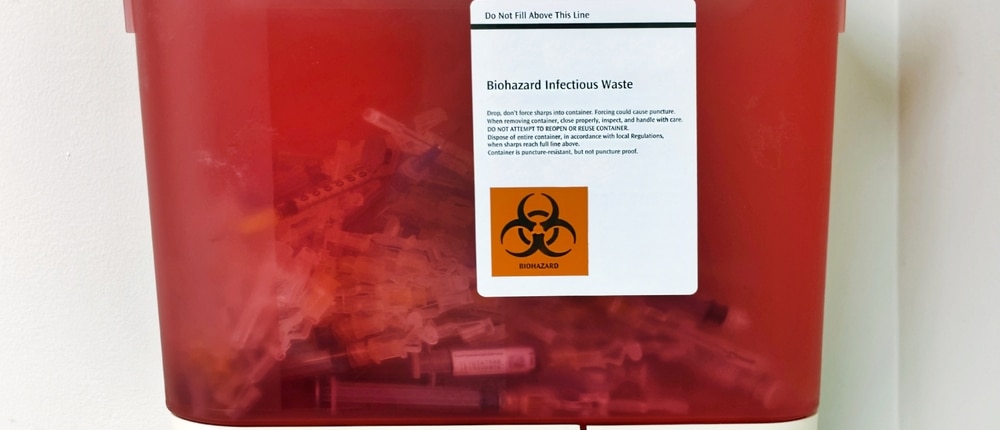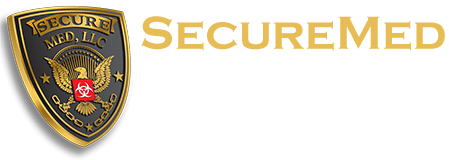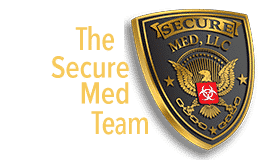
Take the Fear Out of Biohazardous Waste Management
Just the term “biohazardous waste” may sound scary. It refers to any waste that has been (or has even potentially been) contaminated with infectious substances, such as blood. It also includes sharp waste like syringe needles, surgical blades or glass pipettes. Some biohazardous waste could also have been tainted by radioactive material.
Scary? Absolutely!
Types of Biohazardous Waste
Due to the potentially life-threatening consequences of mishandling biohazardous waste, doctors, dentists, nursing homes, and even veterinarians must closely follow stringent guidelines for what to do with the different types of waste that their occupation produces. These could include wastes that have come in contact with:
· Human blood and blood products
Cotton swabs, sheets, wipes and gloves that – when squeezed – would release blood or blood products (i.e. serum, plasma or other blood components), is considered biohazardous waste. Items that are caked with dried blood that could flake off when handled is also included.
· Human bodily fluids
It’s not just blood that could create biohazardous waste. Semen, vaginal secretions, saliva from dental procedures, cerebral spinal fluid, along with a number of other bodily fluids (i.e. synovial, pleural, pericardial, peritoneal, amniotic, etc.) or any other fluid that has been contaminated with blood are also biohazardous.
· Microbiological wastes
If you work in a lab, you may find yourself interacting with specimens, cultures, viruses, pathogens, and serums that could be incredibly infectious! Not only are these items themselves considered biohazardous waste, but also anything that they have touched, including disposable culture dishes, trays, devices, or anything used to transfer, inoculate or mix cultures.
· Pathological waste
Especially in the case of surgeries or autopsies, all body parts, tissues and organs that have been anatomically removed from a human (other than skin) must be treated as biohazardous waste.
· Animal waste
Related to the previous item, all animal carcasses, limbs, body parts or bedding material that may have come in contact with anything infectious to humans must be handled as biohazardous waste.
· Biohazardous Sharps
“Sharps” is a general term that refers to medical or surgical items that may puncture or cut. Sharps could include items such as: needles (loose or attached to a syringe or IV tubing), disposable glass or Pasteur pipettes, scalpels, razor blades, lancets, and broken glass or splintered plastic. When these items have been contaminated with blood or other potentially infectious substances, they are considered biohazardous and must be treated, packaged, labeled and transported as such.

Disposal of Biohazardous Waste
Biohazardous waste materials, when improperly destroyed, could cause or at least significantly contribute to the increased morbidity or mortality of anyone who comes into contact with it. Infectious agents that are highly communicable to humans are not to be taken lightly! Ensuring the secure destruction of this material serves to prevent an infectious disease transmission or an environmental release risk.
There is currently no single federal agency that specifically defines, nor regulates, biohazardous waste. However, once generated, the appropriate disposal of biohazardous waste is critically important. In order to protect anyone who may come into contact with these items, a system must be in place to ensure the correct packaging (to prevent needle sticks or cuts) and transportation (to prevent dangerous exposure) to a certified and secure medical waste disposal facility. You must take responsibility for the biosafety regulations of your workplace.
No Fear Here!
While the consequences of mishandling the biohazardous waste that you generate can be terrifying, you can reduce the fear factor by contracting with a local, certified secure medical waste destruction partner to support your efforts. Contact SecureMed, located in the greater Birmingham and Huntsville, AL areas, to get the answers you need regarding biohazardous waste disposal. Receive a free quote or an assessment of what your healthcare or medical facility may need when you contact us today!







